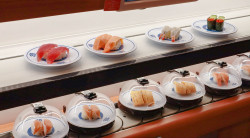
Originally published on metropolis.co.jp on February 2013

AKB48 may rule J-pop with a regime that demands ever-perky youth, but there are some surprisingly mature songstresses out there who have managed to beat the idoru syndrome.
Think Ayumi Hamasaki, Namie Amuro, and on the artier end, UA and Chara—the latter of whom recently dropped her first big release in years.
“Idols are fine,” Chara begins generously in an interview at her label Sony’s Nogizaka office, “but it seems like that’s all you see on TV now. Everybody looks the same.”
The recent commotion over AKB star Tomomi Kasai’s near-pornographic photo of herself with a young boy clutching her naked breasts from behind makes an interesting contrast with the cover for Chara’s new Cocoon.
Kodansha’s now withdrawn-from-publication AKB photo played on MILF (look it up) fantasies under the vague guise of young motherhood. But Chara’s Cocoon shot, which depicts her and an unidentified man bound and embracing, offers an abstract if provocative symbol of metamorphosis and regeneration.
“I’m divorced now, but I want to fall in love and have children again,” Chara explains. “Maybe that had something to do with the cover—the whole album is a bit confessional.”
The contrast of AKB’s masturbation fantasies with Chara’s adult sensuality doesn’t stop with their respective choice of imagery. Where the AKB girls are banned from having boyfriends—on pain of public self-humiliation as the world has just found out—Chara broke the idol mold by not ending her career when she had her first child with actor Tadonobu Asano at age 27.
“When I debuted, it was unusual for women to keep performing after they gave birth,” she recalls. “People told me to keep it a secret. But I may have changed the way things work, because it’s no longer necessary to stay quiet.”
Born Watabiki Miwa, Chara (a high-school nickname) didn’t give any early hints of her future iconoclastic stardom. She had a fairly conventional childhood in suburban Saitama, studying piano and then going on to a music vocational school that she dropped out of after a year.
After a demo tape made its way to Sony, Chara scored a deal and released her debut album, Sweet, in 1991. Her second album, Soul Kiss, won the 1992 Japan Record Award for best rock/pop album from a new artist.
But it wasn’t until Chara appeared in two films by director Shunji Iwai that she really blew up nationwide. She met her husband playing a mental patient in Picnic in 1994, and in 1996 scored a number-one hit with the theme song “Swallowtail Butterfly” (“Ai no Uta”) for the movie of the same name, in which she plays a prostitute who aspires to musical stardom.
Cocoon marks a return to the majors after a few years as an independent following her 2009 divorce from Asano. “There are certain things you can’t do with an indie that I wanted to do with a major label,” she notes about her new home on Sony’s Ki/oon imprint. “I’d been recording with an engineer at home, but this time I wanted to work with a range of people to do something different.”
Cocoon situates Chara in a sometimes dizzying array of styles. The opener, “Funhouse,” is all summertime reggae; the first single “Orutana Garufurendo” is playful electro-punk; the title track begins in dreamy fashion before segueing into cocktail blues and finally ecstatic rock.
“When I started writing there were a lot of songs that were based on the concept of cocoon and birth, but Cocoon ended up being the only one to retain it,” she says.
“Now in Japan the birthrate is falling and people aren’t able to get married and have kids even though they want to,” she adds. “I did fail at marriage once, but marriage is great and having kids fantastic, so I want to do it again if possible.”
With her crackling, childlike voice and sometimes eyebrow-raising life decisions, Chara upended convention in many ways. She believes the challenges now facing the music business encourage conservatism among aspiring singers.
“Compared to when I debuted, it’s harder,” she says. “Twenty years ago the record companies could afford to spend more time and resources developing artists, whereas these days if you don’t sell right away then that’s it, you’re cut.
“As a result there’s less innovation and less of a revolutionary spirit. But I still believe in the magical power of music and that there are amazing artists who’ll find a way to be discovered—exactly how is for the record companies to figure out. They are facing a tough dilemma.”
Zepp Tokyo, Mar 23 and Shibuya Kokkaido, Apr 13







